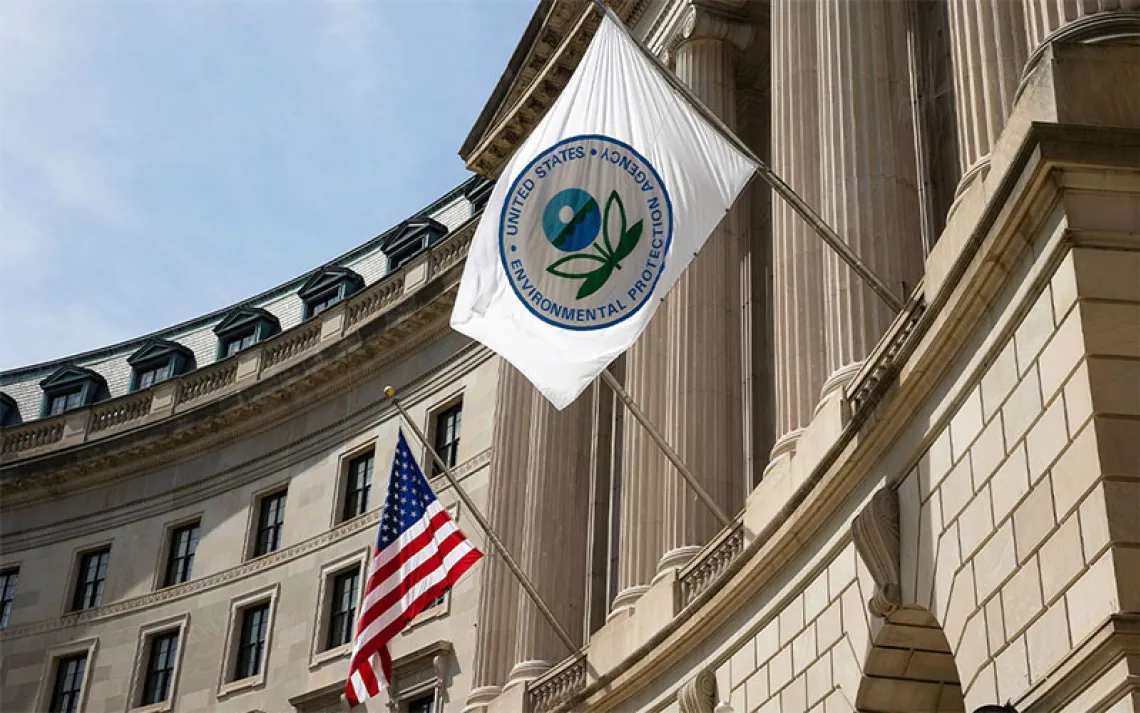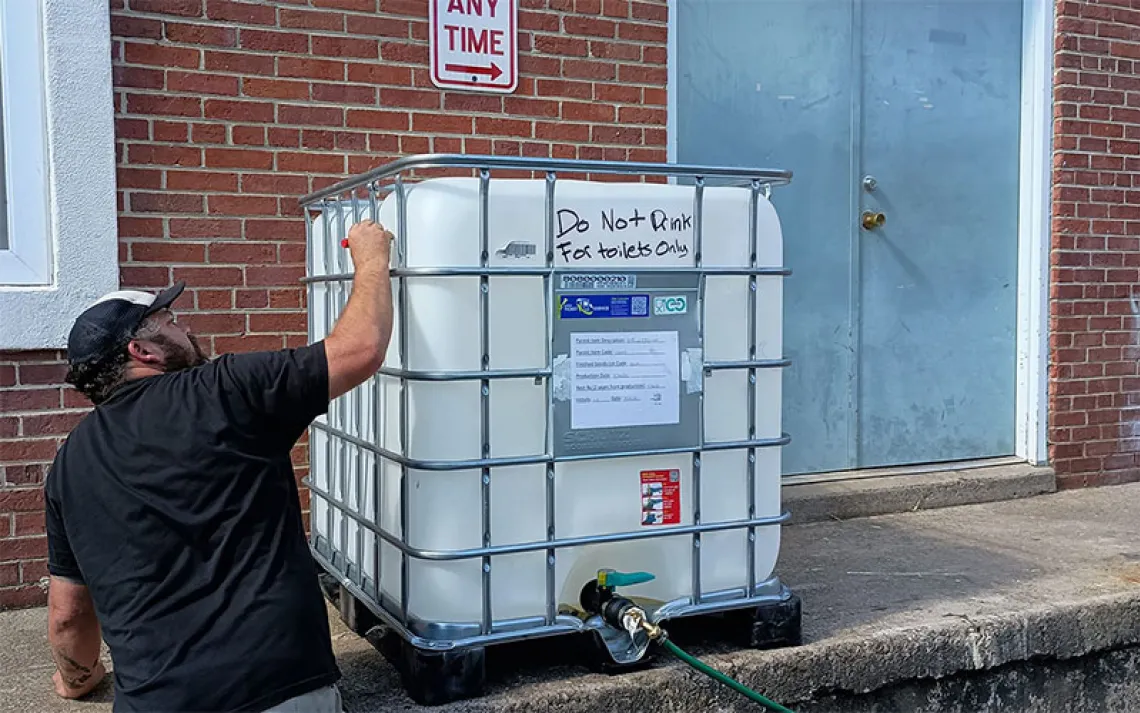Climate Change Costs Are Starting to Bite Business
Corporate America wants a stable business climate, and climate chaos is anything but

Damage from 2018's Hurricane Michael in Callaway, Florida. Waffle Houses have a reputation for remaining open whenever possible, so FEMA unofficially tracks the severity of natural disasters by the number of branches still slinging waffles. | Photo by Julie Dermansky
What will it take for American businesses to get serious about fighting climate change? Maybe this: In January, facing $30 billion in liabilities for its role in recent wildfires, California's mighty investor-owned utility Pacific Gas and Electric filed for bankruptcy protection. Overnight, the company lost half its value. "There is a fundamental shift taking place right now in business," says Joel Makower, chair and executive editor of GreenBiz Group, "and the shift is from 'What is business doing to the climate?' to 'What is climate doing to business?'"
If business does nothing, the downside is enormous. In North America, extreme weather events and natural disasters caused $91 billion in damages in 2018 alone, and the latest National Climate Assessment warns that if the world does not take strong action soon, annual losses to US businesses could total half a trillion dollars.
"In a world of major disruptions–floods, droughts, fires, and all the rest–the world's largest investors are demanding to know, 'What does your company look like under different temperature-rise scenarios?' Their supply chains, customer base, employee base, their facilities?" Makower says. When Hurricane Maria leveled Puerto Rico in 2017, for instance, pharma giant Merck lost its supply of the popular cholesterol drug Atozet and the chemotherapy drug Temodar, which were manufactured there; the company now cites climate risks in its annual financial filings.
That makes it part of a growing trend. A UK nonprofit called CDP (formerly the Carbon Disclosure Project) has collected climate-risk data from nearly 7,000 companies globally, including more than 1,800 in the United States. Intel and Coca-Cola worry about water shortages. Bank of America reports that 4 percent of its real estate loans are in flood zones. (Meanwhile, Apple thinks that climate disasters could be good for iPhones, since they can be used as flashlights or sirens.) In 2017, 70 percent of S&P 500 companies disclosed the climate risks their organizations face.
Investors aren't relying solely on companies' self-reported risks. Market analysts are sniffing out corporations that may be bad bets down the line. Barron's got advisory firm Four Twenty Seven to assess which S&P 500 companies are most exposed to climate risk: At the top of the list was Norwegian Cruise Lines, with its Miami headquarters and facilities threatened by sea level rise and hurricanes. Storm and flood threats dinged many others, including Western Digital, NextEra Energy, Micron Technology, and Eastman Chemical Company. Ironically, the study found that some big money managers themselves were at risk, including two-thirds of the facilities of T. Rowe Price Group, located on Chesapeake Bay in Baltimore.
Disclosing climate risk to potential investors, however, is a minimal corporate response to a gathering global crisis. Kevin Moss is the global director of the World Resources Institute's Center for Sustainable Business, which seeks to convince companies to commit to (among other things) adopting "science-based targets" for their own operations–that is, doing what is necessary to meet the goal set in the 2015 Paris Agreement to keep global warming to below 2ºC. Thus far, 534 companies–102 of them in the United States–have signed on, with 176, including 37 US companies, following through with validated plans.
"That's pretty good," Moss says. "Those targets are not easy to meet." (Full information is available at sciencebasedtargets.org.) Companies prefer this long-term approach over year-to-year targets, Moss says, because it gives them a clear view forward. Another plus is the public nature of the process: "It's the C-suite wanting to take action, to be seen taking action, and to be seen taking enough action."
It doesn't help, though, that the current administration in Washington, D.C., barely accepts the concept of science, let alone science-based targets. One of Donald Trump's early actions as president was to pull out of the Paris accord, calling it "an agreement that disadvantages the United States to the exclusive benefit of other countries." Even so, says Moss, some 3,000 companies have signed on through a variety of organizations, including America's Pledge and We Are Still In, to fulfill the Paris goals.
Other companies are happy to take advantage of the Trumpian political climate to backslide. The US automobile industry asked for and received a rollback of the fuel-efficiency rules it had agreed to under the Obama administration. The inevitable result will be that carbon emissions from the automotive sector rise at a time when vehicles have replaced energy generation as the country's largest carbon source.
What's next? "One of the pressure points over the next 12 months and certainly over the next election cycle," Makower says, "is getting companies to speak out, to become more politically active on behalf of climate policy and climate action."
What's a good example of a company that's speaking out?
"Almost nobody," he admits.
What will it take? The threat of global catastrophe doesn't seem to be enough. Neither does self-preservation–be it staving off bankruptcy or preventing corporate HQ from going beneath the waves. But then there's this: "Some companies are actually now getting lower interest rates if they can prove they are good performers on lowering climate risk [among other metrics]," Makower says. "When we get to the point where being climate-proactive reduces the cost of money, it's game on."
This article appeared in the May/June 2019 edition with the headline "The Cost of Doing Business."
 The Magazine of The Sierra Club
The Magazine of The Sierra Club



